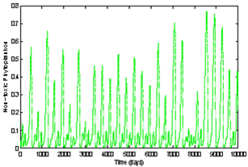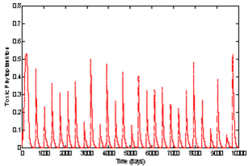Harmful algal blooms as excitable systems
Normally, every spring there is a bloom of different algal species, which is usually not harmful. However, from time to time, some algal species develop extremely large abundances which finally dominate the while ecosystem and which are harmful to other species by taking too much oxygen or even producing harmful substances which hamper the growth of other species or are even lethal. Based on ideas which are usually employed to explain the excitability of neuron, we have developed a model for the emergence of harmful algal blooms (HABs) as a result of competition between harmful and non-harmful phytoplankton species for the same nutrients as well as a preference of the grazers (zooplankton) for the non-harmful species which mimics qualitatively successful the two different dynamics of the two phytoplankton species: While the non-harmful species blooms regularly every year, the harmful species develops very rarely rather large blooms. We have shown under which conditions such HABs occur.

![[Translate to English:]](/f/5/_processed_/3/2/csm_ICBM-Logo-transparent-_91fe1c6774.png)

